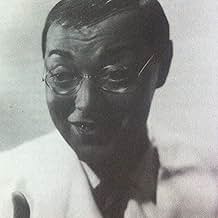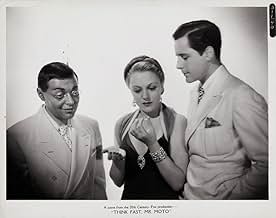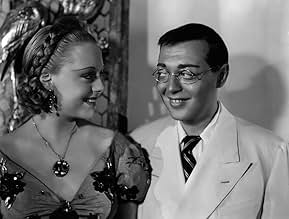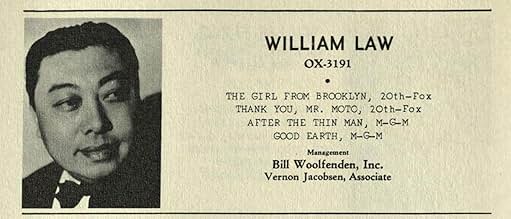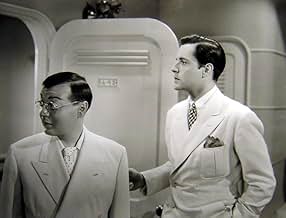NOTE IMDb
6,7/10
1,3 k
MA NOTE
Ajouter une intrigue dans votre langueOn a freighter going from San Francisco to Shanghai Mr. Moto solves mysteries caused by a gang of smugglers.On a freighter going from San Francisco to Shanghai Mr. Moto solves mysteries caused by a gang of smugglers.On a freighter going from San Francisco to Shanghai Mr. Moto solves mysteries caused by a gang of smugglers.
- Réalisation
- Scénario
- Casting principal
Sig Ruman
- Nicolas Marloff
- (as Sig Rumann)
Frederik Vogeding
- Curio Dealer
- (as Fredrik Vogeding)
Philip Ahn
- Switchboard Operator
- (non crédité)
Richard Alexander
- Ivan - Doorman
- (non crédité)
Lloyd Allen
- Nightclub Trombonist
- (non crédité)
William A. Boardway
- Ship Passenger
- (non crédité)
Dudley Brooks
- Nightclub Pianist
- (non crédité)
George 'Red' Callender
- Nightclub Bassist
- (non crédité)
Marcello Estorres
- Ship Passenger
- (non crédité)
Avis à la une
... loosely based on the books by John Marquand, from 20th Century Fox and director Norman Foster. After a series of murders occurs in San Francisco, the mysterious Mr. Moto (Peter Lorre) boards a cruise ship to China, where he befriends Bob Hitchings (Thomas Beck), the son of the owner of the cruise line. Bob has fallen for a moody passenger named Gloria (Virginia Field). Once they make landfall in China, things get dangerous for them all.
This initial outing in the series is different in at least one respect: Mr. Moto's motives and allegiances are kept a mystery for most of the picture. In fact, he's even presented as a possible suspect, or at least in league with the villains. Despite it being another regrettable instance of casting, Peter Lorre is outstanding as Moto, charming, funny, mischievous, and just a little creepy. His performance elevates what would have been just another routine mystery programmer of the day.
This initial outing in the series is different in at least one respect: Mr. Moto's motives and allegiances are kept a mystery for most of the picture. In fact, he's even presented as a possible suspect, or at least in league with the villains. Despite it being another regrettable instance of casting, Peter Lorre is outstanding as Moto, charming, funny, mischievous, and just a little creepy. His performance elevates what would have been just another routine mystery programmer of the day.
The shame of the Japanese-American concentration camps has cast a shadow over the Mr. Moto series, giving it a sorry reputation as an artifact of Hollywood racism. The truth is that as far as European-in-yellowface portrayals of Asians went, Peter Lorre's Moto was far less racist and considerably more sympathetic than the clownish, epigram-spouting Charlie Chan. In fact, it's easy to forget Moto's Japaneseness altogether and just view him as yet another wondrous manifestation of the white-linen-suited, Austrian-accented Lorreness so prevalent between the wars in films like "Strange Cargo," "Island of Doomed Men," und so wieter. Audiences certainly took to the little fellow in this first entry in the series, which introduces Moto in all his enigmatic glory--the bemused, politely ironical man of action with his love of kittycats, preference for cow's milk over whiskey, and disdainful conviction that beautiful women only confuse a man. Though Lorre reportedly had no idea what the whole thing was supposed to mean and spent his time offstage disconsolately listening to his archenemy Hitler on the radio, the eight Moto films established him as one of Hollywood's most beloved personalities and gave millions of small men who wore glasses the hope that they, too, could be strong and adorable.
Ah, the Thirties. What could be more elegant and enjoyable than an ocean liner to the Orient, with two heartbreakingly beautiful people having a shipboard romance while criminal intrigue sort-of-kind-of goes on around them and they are watched over by a genial Japanese man who may or may not be a good guy? And that's really about all there is to the slapdash plot of the first movie in the Mr. Moto series. Yes, there's something about diamond smuggling and murder, but the main point of this story seems to be to introduce the world to the polite but dangerous gentleman from Japan.
And that is something that surprised me about this little movie (it clocks in at under 70 minutes) -- just how dangerous Mr. Moto is. Throughout the first hour he is presented as someone who's more interested in making an allegiance with the smugglers than stopping them. The movie begins with him in disguise looking into the San Francisco end of the smugglers, seeing -- but not reporting -- a murdered body and getting away so he can quietly head for Shanghai. He shows he's a black belt in jiu-jitsu by tossing a few disrespectful drunks around, including the son of the man who owns the ocean liner he's traveling on. And he kills a killer in such a way that no one can find the body...then calmly, albeit a bit sadly, continues his secretive journey. It's not until the last few minutes of the movie that his real purpose and superior intelligence is revealed. To have a Japanese man out-thinking all the sneaky Caucasian minds around him is really quite startling for 1937, considering the casual xenophobia of the time.
"Think Fast, Mr. Moto" may be an obvious attempt to capitalize on the hugely popular (and usually much better) "Charlie Chan" series of mysteries, but it works very well in its own right. Peter Lorre does a fine job (of course) pretending to be Japanese, but something that I've never understood is why Thomas Beck never got to be big in Hollywood. He has such a natural grace in front of the camera, and he's extremely good-looking. The same holds for Virginia Field, though she did have more of a career than he. The production values are above average for a "B" movie and the pace is relatively brisk. If they'd just done a better job with the script, it could have been on the same level as "Charlie Chan in Shanghai." But as it is, it's still surprisingly fun.
And that is something that surprised me about this little movie (it clocks in at under 70 minutes) -- just how dangerous Mr. Moto is. Throughout the first hour he is presented as someone who's more interested in making an allegiance with the smugglers than stopping them. The movie begins with him in disguise looking into the San Francisco end of the smugglers, seeing -- but not reporting -- a murdered body and getting away so he can quietly head for Shanghai. He shows he's a black belt in jiu-jitsu by tossing a few disrespectful drunks around, including the son of the man who owns the ocean liner he's traveling on. And he kills a killer in such a way that no one can find the body...then calmly, albeit a bit sadly, continues his secretive journey. It's not until the last few minutes of the movie that his real purpose and superior intelligence is revealed. To have a Japanese man out-thinking all the sneaky Caucasian minds around him is really quite startling for 1937, considering the casual xenophobia of the time.
"Think Fast, Mr. Moto" may be an obvious attempt to capitalize on the hugely popular (and usually much better) "Charlie Chan" series of mysteries, but it works very well in its own right. Peter Lorre does a fine job (of course) pretending to be Japanese, but something that I've never understood is why Thomas Beck never got to be big in Hollywood. He has such a natural grace in front of the camera, and he's extremely good-looking. The same holds for Virginia Field, though she did have more of a career than he. The production values are above average for a "B" movie and the pace is relatively brisk. If they'd just done a better job with the script, it could have been on the same level as "Charlie Chan in Shanghai." But as it is, it's still surprisingly fun.
I love these Moto flicks. I'll tell you that right out of the gate, and the history of these low budget detective films is almost more interesting then the films themselves. First of all, Peter Lorre was one of the most underrated actors in cinema history. In fact, those who knew him thought he would have been a psychiatrist had he not been an actor, which tells me he studied people and learned a lot about how a little goes a long way in a portrayal. The director reportedly wanted character actor J. Edward Bromberg to play the lead but the studio gave him this Hungarian Jew just out of Hitler's Germany to play the part, which made the director go berserk. He needn't have worried.
Forget the fact that Lorre was in such poor health in those days after starving in Europe for most of his adult life and had to have a stuntman do his jiu-jitsu scenes for him. (Harvey Parry was his name. Another underrated genius in cinema history who did stunts for everyone from Douglas Fairbanks Sr. to Buster Keaton and Harold Lloyd) Lorre is just terrific and with almost no make-up, he is damned convincing as a Japanese detective.
A short side note here. Please pretend that there was never a 1960s Moto movie with Henry Silva. The eight 20th Century Fox Motos are to be treasured. It's only a shame that World War II stopped the series for good.
As for J. Edward Bromberg, he even acted in one of the Moto films as a Rajah in Thailand (which acerbic yet clever critic referred to as "Indoors China") before he was hurt by the blacklist and died a sad and broken man, who unintentionally hurt the career of actress Lee Grant when she attended his funeral and was herself blacklisted until the movie "In The Heat Of The Night."
Watching Peter Lorre in any film is always a delight and the Motos never disappoint for pure entertainment value.
Forget the fact that Lorre was in such poor health in those days after starving in Europe for most of his adult life and had to have a stuntman do his jiu-jitsu scenes for him. (Harvey Parry was his name. Another underrated genius in cinema history who did stunts for everyone from Douglas Fairbanks Sr. to Buster Keaton and Harold Lloyd) Lorre is just terrific and with almost no make-up, he is damned convincing as a Japanese detective.
A short side note here. Please pretend that there was never a 1960s Moto movie with Henry Silva. The eight 20th Century Fox Motos are to be treasured. It's only a shame that World War II stopped the series for good.
As for J. Edward Bromberg, he even acted in one of the Moto films as a Rajah in Thailand (which acerbic yet clever critic referred to as "Indoors China") before he was hurt by the blacklist and died a sad and broken man, who unintentionally hurt the career of actress Lee Grant when she attended his funeral and was herself blacklisted until the movie "In The Heat Of The Night."
Watching Peter Lorre in any film is always a delight and the Motos never disappoint for pure entertainment value.
On a freighter going from San Francisco to Shanghai, Mr. Moto (Peter Lorre) solves mysteries caused by a gang of smugglers. First of the series.
Director Norman Foster was given this B-movie assignment, but it is probably better remembered today than many of the A pictures that came out at the time. With Peter Lorre, a strong (if under-appreciated) actor taking the lead, this was guaranteed to be something special.
Say what you will about the racism, sexism, or anything else of this nature. Such things have to be overlooked sometimes, and this is one of those times. The film is just too clever to be faulted.
Director Norman Foster was given this B-movie assignment, but it is probably better remembered today than many of the A pictures that came out at the time. With Peter Lorre, a strong (if under-appreciated) actor taking the lead, this was guaranteed to be something special.
Say what you will about the racism, sexism, or anything else of this nature. Such things have to be overlooked sometimes, and this is one of those times. The film is just too clever to be faulted.
Le saviez-vous
- AnecdotesMr. Moto's hangover remedy: lemon juice, pinch of salt, 1 egg, 4 dashes orange bitters, 1 jigger Worcestershire sauce, 2 tsp sugar, absinthe, fill to top with gin. Stir. Drink.
- GaffesWhen Mr. Moto photographs Gloria in Honolulu, she is looking directly into the camera, but when he shows the photograph to the police chief in Shanghai she is looking away from the camera at Bob who is obscuring half the photograph even though he was standing beside Mr. Moto, not in front him, and thus should not be in the photograph at all.
- Citations
Kentaro Moto: Half the world spends its time laughing at the other half, and both are fools.
- ConnexionsFeatured in Cinema's Exiles: From Hitler to Hollywood (2009)
Meilleurs choix
Connectez-vous pour évaluer et suivre la liste de favoris afin de recevoir des recommandations personnalisées
- How long is Think Fast, Mr. Moto?Alimenté par Alexa
Détails
- Durée1 heure 10 minutes
- Couleur
- Rapport de forme
- 1.37 : 1
Contribuer à cette page
Suggérer une modification ou ajouter du contenu manquant

Lacune principale
By what name was L'énigmatique M. Moto (1937) officially released in India in English?
Répondre

